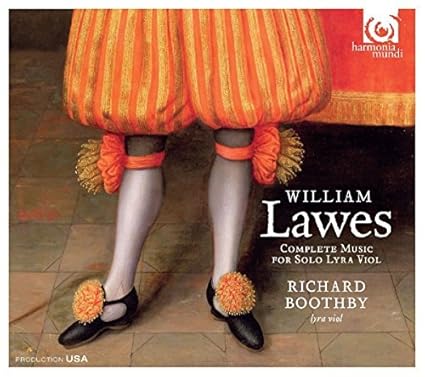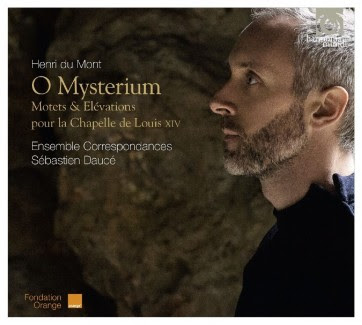Program: #16-35 Air Date: Aug 22, 2016
To listen to this show, you must first LOG IN. If you have already logged in, but you are still seeing this message, please SUBSCRIBE or UPGRADE your subscriber level today.
The early 17th century in France (both sacred and secular) and the amazing solo work by the English composer killed in the Puritan revolution.
NOTE: All of the music on this program features music from the Harmonia Mundi label. For more information:
I. Bien que l’amour…airs sérieux et à boire (Les Arts Florissants/William Christie). Harmonia Mundi CD HAF 8905276.

With this anthology of airs sérieux and airs à boire of the Grand Siècle, Les Arts Florissants launches a new series on harmonia mundi. We may listen to the tracks on this disc as contemporaries turned the pages of successful collections of songs alternating between invocations to Bacchus and invitations to love. Around William Christie at the harpsichord and his musicians, five singers offer multiple combinations of close-knit voices. From the intimacy of the salons to the liveliness of court banquets, these airs, models of refined skill, make light of the paradoxes of our hearts – for as an air by Lambert tells us: ‘Though Love creates all my grief, / I wish to love and to die loving.’
Michel Lambert [1610-1696]
1 D'un feu secret je me sens consumer 1'59
2 Le repos, l'ombre, le silence 6'48
3 Ah! Qui voudra désormais s'engager? 2'36
4 Il faut mourir plutôt que de changer 5'04
François Couperin [1668-1733]
5 Epitaphe d'un paresseux :Jean s'en alla comme il était venu 1'21
6 Les Pèlerines 4'38
Michel Lambert [1610-1696]
7 Iris n'est plus, mon Iris m'est ravie 3'58
8 Bien que l'Amour fasse toute ma peine 3'52
Joseph Chabanceau de La Barre
9 Quand une âme est bien atteinte 6'16
Marc-Antoine Charpentier [1643-1704]
10 Intermèdes nouveaux du Mariage forcé (H.494) 7'57
Michel Lambert [1610-1696]
11 Chantez petits oiseaux dans la saison nouvelle 2'13
12 Pour vos beaux yeux, Iris, mon amour est extrême 2'19
13 Que d'Amants séparés languissent nuit et jour 9'29
Honoré d'Ambruys
14 Le doux silence de nos bois 4'15
Marc-Antoine Charpentier [1643-1704]
15 Ayant bu du vin clairet (H.446) 1'08
16 Auprès du feu (H.447) 0'56
17 Beaux petits yeux d'écarlate (H.448) 1'51
Michel Lambert [1610-1696]
18 Jugez de ma douleur en ces tristes adieux 8'58
19 Il est vrai, l'amour est charmant 1'36
20 Tout l'Univers obéit à l'Amour 2’40
II. William Lawes—Complete Music for Solo Lyra Viol (Richard Boothby, lyra viol). Harmonia Mundi CD HMU 907625.

Some of the most famous English composers of the 17th century wrote pieces for the lyra viol, or even entire anthologies. These composers include John Cooper, John Jenkins, Christopher Simpson, Charles Coleman, and William Lawes. Due to the number of strings and their rather flat layout, the lyra viol can approximate polyphonic textures, and because of its small size and large range, it is more suited to intricate and quick melodic lines than the larger types of bass viol.
Employed as “musician in ordinary for lutes and voices” at the court of Charles I, English composer Lawes (1602-1645) is most admired today for his sublime suites for viol consort. His less familiar solo repertoire for lyra-viol is performed here by Richard Boothby, a founder member of Fretwork, on the best preserved instrument of the period (Richard Meares, c. 1647-1725) which is now part of the Kessler Collection in the museum of the Royal College of Music, London.
From Gramophone: Lock the doors, close the curtains and turn the lights down before putting this disc on. Here is music for an intimate space: solo music for solitary souls. This is a rare opportunity to hear solo lyra viol music from the early 1630s played on a beautiful period instrument by one of today’s foremost exponents of the Jacobean repertoire. Richard Boothby has been playing English consort music (some of it by Lawes) with Fretwork for over 30 years, so is as well placed as anyone today to interpret this body of solo music, most of it recorded here for the first time.
Samuel Pepys apparently played lyra viol music on whatever viol he had to hand, but in fact the lyra differs from the slightly larger bass viol in several respects: the strings are lighter and closer to the fingerboard, the bridge more rounded to accommodate the execution of chordal passages and, in addition, some instruments were strung below the fingerboard with sympathetic strings that could be plucked by the left hand. Unlike other viols – and members of the violin family – the lyra was variably tuned, and its music notated in tablature. Boothby plays on an exquisite lyra viol by Richard Meares from the Royal College of Music Collection.
Lawes’s music is in general jolly and introspective by turns. Boothby plays in a charmingly gentle, often elegant yet spare way that suggests he is enjoying a private pleasure which we are nonetheless invited to savour. The 35 pieces included here are mostly dances, none lasting longer than three minutes, characterised by syncopated rhythmic patterns, delicate implied harmony and chordal accompaniments, conversational textures (the Corantos in particular) and occasional hints of folksong. The delicacy with which Boothby phrases and ornaments the music is sublime. A great night in, then.
Prelude, VdGS 435, Country Coll, VdGS 421, A Jigge, VdGS 422, Almain, VdGS 491, Coranto, VdGS 512,
Almain, VdGS 461, Coranto, VdGS 423, Air, VdGS 596, Almain, VdGS 462, Coranto, VdGS 424, Almaine, VdGS 511,
Coranto, VdGS 513, Saraband, VdGS 514, Almain, VdGS 463, Coranto, VdGS 465, Saraband, VdGS 467,
Almain, VdGS 543, Coranto, VdGS 541, Almaine, VdGS 464, Corrant, VdGS 425, Saraband, VdGS 434,
Almain (Pavan), VdGS 542, Coranto, VdGS 544, Almain, VdGS 430, Corant, VdGS 426, Saraband, VdGS 433,
Corant, VdGS 427, Saraband, VdGS 591, Corant, VdGS 428, Saraband, VdGS 466, Coranto, VdGS 545,
Coranto, VdGS 546, Corant, VdGS 429, Corant, VdGS 431, Saraband, VdGS 432
III. Henry Du Mont—O Mysterium (Ensemble Correspondances/ Sébastien Daucé). Harmonia Mundi CD HMU 902241.

Cultivated at the height of the French baroque, Henry Du Mont's Grands Motets were written for the court of Louis XIV and published posthumously in 1684. Alongside Lully, Du Mont is credited as the creator of the form - an opulent style of church composition for soloists and choir. On O Mysterium, Sebastien Dauce leads the Ensemble Correspondances in a program of Du Mont 's Motets & Elevations pour la Chapelle de Louis XIV.
For twenty years (from 1663 to 1683) Henry Du Mont directed the music of the Sun King's chapel. For the daily Mass heard there he built up a new musical repertory consisting of motets for full chorus and more intimate pieces for solo voices. The former aimed to transpose to the context of the 'ordinary' the format of the large-scale works conceived for extraordinary ceremonies. Sébastien Daucé presents an innovative approach to these 'grands motets' that at once links specific musical features with historical data and reveals all their beauties in every detail.
"This admirable recording consists of five grands motets and six élévations or petits motets…Sébastien Daucé's direction is lively and sensitive, and the recorded sound is exemplary" (Gramophone)
"The works here combine devoutness with an indulgent richness, surely what the job demanded. The harmonies are always expressive, and there are some magical things, not least the build-up of texture in O Mysterium itself. Under Sébastien Daucé's direction, these performances are deliciously opulent." (Sunday Times)
1 Memorare 7'36
2 Jesu dulcedo cordium 3'41
3 Desidero te millies 3'07
4 O æterne misericors Deus 8'50
5 Sub umbra noctis profundæ 4'21
6 O mysterium 7'19
7 Allemanda Gravis 3'10
8 Ave Regina cælorum 3'29
9 O dulcissima 10'55
10 Quam pulchra es 4'57
11 O præcelsum 3'27
12 Super flumina Babylonis 10'18
Composer Info
Michel Lambert [1610-1696], Marc-Antoine Charpentier [1643-1704], William Lawes (1602-1645), Henry Du Mont
CD Info
CD HAF 8905276, CD HMU 907625, CD HMU 902241